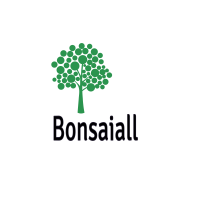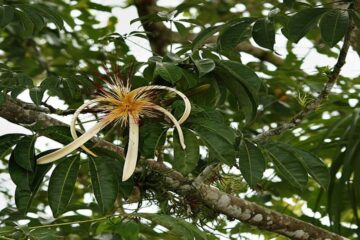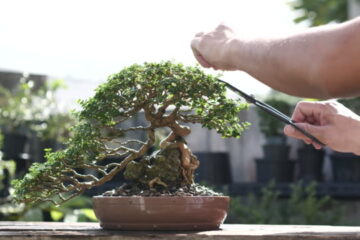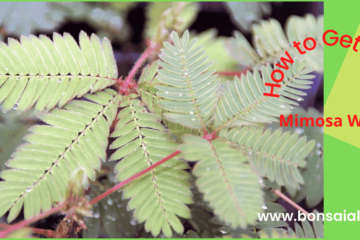Bonsai trees are beautiful plants that require special care and attention. They also take a long time to mature. If you want to start growing bonsai plants, you should know what kind of bonsai soil mix they prefer.
Bonsai trees are valued for their unique shape and beauty. The roots of these plants are shallow and compact, making them ideal for growing in pots or containers, but they require good bonsai soil Mix.
Good bonsai soil is capable of providing rich nutrients, water absorption, aeration and proper excess water drainage. Understanding what makes the best bonsai soil mix is important for healthy bonsai plants.
This article will cover all about bonsai soil composition and soil mix to help you understand the best bonsai soil available and bonsai soil requirements.
The 5 best bonsai Soil
Content Overview
Bonsai trees can be grown from dwarf trees and any number of tree species. They live and thrive both indoors and outdoors, and will require a small amount of soil regardless of the environment in which they grow.
Choosing the right type of soil is fundamental as it will provide nutrients for your bonsai plant. Most bonsai soil does not contain actual soil.
Soil material will be a mixture of varying percentages of clay, rock and organic matter. Here are our recommendations for the best bonsai plant soil and why we recommend them.
1. Boon Bonsai Soil Mix “Boon Mix”
Bun bonsai soil mix is the most common and widely accepted mix among bonsai masters and professionals worldwide.
The name “Boon Mix” originates from Boon Manakitvpart, a major promoter of bonsai tree health in the United States.
Boon Mix is mostly made of non-organic soil ingredients and is considered real bonsai soil. No bark, mulch, dirt, etc
If the garden soil dries out too quickly, it can be difficult for plants to grow properly. Bonsai does not like dirt and will not survive in the ground for too long.
Pros of The Bun Bonsai Soil Mixture
- Ready to use out of the bag
- Good drainage
- Good ventilation for the roots
- Pre-sifted before bagging
- Helps in Fertilization
- Helps promote more beneficial bacteria
Cons of The Bun Bonsai Soil Mix
- Would prefer more akadama in the mix so it makes 1/3 evenly
2. Hoffman Bonsai 10708 Soil Mix
Hoffmann Bonsai Soil This premium bonsai soil mix combines pine bark, hydite and sand gravel.
Professionally and perfectly formulated for excellent drainage, it also retains moisture for the health of your plants. This soil mixture is especially appreciated by gardeners who grow evergreen species of bonsai plants.
It is a pre-mixed mixture ready for immediate use in a convenient resealable bag.
Hoffman Bonsai 10708 Soil Mix Pros
- Hands mixed
- Specially formulated for bonsai plants
- Resealable bag for convenience
- Organic with nutrients and trace elements
- Great for evergreens
Hoffman Bonsai 10708 Soil Mix Cons
- Not aesthetically pleasing
3. Birch Seeds All-Purpose Bonsai Tree Potting Soil
Formulated for all species of bonsai plants, Birch Tree Bonsai Potting Soil is an all-purpose blend of premium peat moss and perlite-based grit.
It’s a quick-draining mix that also contains perlite along with horticultural-grade sand and lime to ensure aeration of the bonsai plant’s root system.
Sold in a resealable bag it’s ready to use and creates no mess when you’re ready to repot your bonsai.
Pros of Birch Seed Bonsai Plant Potting Soil
- Premium and horticultural-grade ingredients
- Reusable handy bag
- Affordable for the quantity
- Formulated for all types of bonsai plants
Cons of The Birch seed bonsai tree potting soil
- Some observations on water retention and drainage
4. Tinyroots Deciduous Bonsai Tree Soil Blend
Tinyroots deciduous bonsai soil mix offers everything you can imagine for your bonsai plant care.
This soil mix provides hand-mixed, pre-mixed natural and organic bonsai soil specially formulated for deciduous bonsai plants such as elm or maple.
The mixture consists of aqdama, coarse river sand, frit, turf and very fine pine bark. Tinyroots combines 28 trace elements that are important to your plant’s health.
Tinyroots makes other soil mixes, including single substrate if you want to mix your own.
Pros of TinyRoots Deciduous Bonsai Tree Soil Mix
- Hand mixed and pre-sifted
- Specially formulated for deciduous bonsai plants
- Resealable bag for convenience
- Organic with nutrients and trace elements
Cons of the Tinyroots Deciduous Bonsai Tree Soil Mix
- More expensive than other bonsai clay brands
5. Tinyroots Premium Bonsai Soil for Conifers
These two-quarters/4 lbs. All-natural and organic TinyRoots Premium Bonsai Plant Soil Bags are specially blended for conifer bonsai plants.
This soil mix is designed for the soil needs of juniper, black pine, white pine, cypress and cedar trees as well as other conifers.
Premium bonsai soil contains top-quality ingredients including 28 vitamins and minerals for akdama, frit, turf and conifer health. River sand and clay bark are also included for improved nutrition.
This is a ready-to-use blend for all your repotting needs, offering excellent drainage and moisture retention.
Learn More : How to Repot a Bonsai for Beginners Complete Solutions
Pros Of The Tinyroots Premium Bonsai Soil
- Hand mixed and pre-sifted
- Specially formulated for conifer bonsai plants
- Resealable bag for convenience
- Organic with nutrients, vitamins, minerals and trace elements
Cons of Tinyroots Premium Bonsai Soil
- Expensive
6. Fujiyama All Purpose Bonsai Mix
Fujiyama All Purpose Bonsai Mix is a premium bonsai soil mix that works well with conifer, evergreen or deciduous bonsai plants. It offers exceptional drainage and moisture retention for thriving bonsai.
The soil mix is made up of both inorganic and organic soil components to ensure aeration of the root system and no compaction of the soil.
Fujiyama offers a variety of package sizes for sale, including 2, 4, 10, and 20-quart bags.
Fujiyama All Purpose Bonsai Mix Pros
- Premium bonsai soil mix
- Exceptional drainage
- Good water retention
- Good ventilation
- Various sizes of bags available for purchase
Cons Of the Fujiyama All Purpose Bonsai Mix
- Not always in stock, so may be hard to get your hands on.
Bonsai Soil Mix Guide
All of the above bonsai soil mixes that you can buy online or at garden centers are ready-mixed soil. Even though they’re ready to go, it’s still important to understand things like soil composition to know what’s best for healthy bonsai plant roots.
What is standard bonsai soil made of?
The best type of bonsai soil you choose will depend somewhat on the bonsai species you are cultivating. Basic standard bonsai soil will be a mixture of clay layer, lava rock, organic matter and pumice.
Although bonsai soil will vary from one brand to another, the basic ratio that is considered best for conifers is 1:1:1. It is one part lava rock, one part pumice and one part akdama, a naturally occurring granular clay. Maple trees and deciduous trees, in general, do better with a 1:1:2 ratio.
Some brands will include peat moss and tree bark chips in their mix, but these ingredients should be added judiciously. Exceptionally nutritious, but can hinder soil drainage and proper root aeration.
Bonsai Soil Aeration
Bonsai plants need oxygen to grow strong roots. If the roots are packed into a standard dirt and compost soil mix, they won’t have access to enough oxygen.
A loose bonsai soil mix leaves room for air to enter and circulate, so root systems benefit from proper ventilation and little air pockets.
Soil Drainage of Bonsai
Well-drained soil is crucial to the health of your bonsai plant. If you plant your bonsai in a pot with standard garden soil and water it, the compacted dirt retains moisture in the soil. Bonsai roots will slowly sink because they have no access to oxygen.
Most bonsai species will not enjoy sitting in water, as it can cause the plant’s roots to rot. Root rot left untreated will kill your plant.
The right bonsai mixing soil will have excellent drainage properties that allow any excess water to drain from the bottom of the bonsai pot after you finish watering.
Water Retention Soil of Bonsai
This may seem like a contradiction after reiterating the need for great extraction, but it is not.
Just because your plant doesn’t want to sit in water, also known as “wet feet,” doesn’t mean it doesn’t need water. If your plant is only planted in rock or gravel, the water will run out and nothing will remain, meaning the roots will not have access to the water they need to survive. Learn How to revive a bonsai tree
For this reason, bonsai soil types contain one or more components that retain water. Granular natural clay known as Akdama, originating in Japan, is a popular solution for retaining water when growing bonsai trees. This material is baked to provide a gravel-like substrate.
Nutrient Value of Bonsai Soil
Bonsai soil contains little or no organic matter, so it will also have very little nutritional value for your plants. For this reason, regular fertilization of your plant is key.
The three nutrients most plants need are nitrogen, phosphorus and potassium. Your plant needs a bonsai fertilizer with these ingredients to keep it thriving.
Bonsai fertilizers are available in pellet or liquid plant food form.
Bonsai soil pH level
For most bonsai plants, soil pH levels should measure between 6 and 6.5. If the pH is high, the soil will be alkaline. When the pH is low, it is acidic soil.
Proper soil mix of bonsai fertilization will not only provide essential nutrients, but also help balance the pH level in the soil mix.
Alkaline plants are more common and are usually caused by lack of fertilization or poor water quality. A good bonsai fertilizer that contains sulfur can help regulate pH levels. You can measure the pH level with a soil pH meter.
How is bonsai soil different?
Bonsai soil is different from normal potting soil and is not recommended for use with plants other than bonsai plants. The composition and composition of the soil is different for bonsai plants to grow strong roots.
Bonsai mixes contain little to no soil. This helps keep the mixture loose and spacious, allowing for better airflow around the roots. This helps the soil mix to stay light and not compact as opposed to heavy mixes.
A typical bonsai mix will contain a large amount of inorganic material, such as diatomaceous earth or fired clay.
With houseplants, you need to provide nutrients, so organic soil and compost are preferable. Inorganic matter is best for bonsai plants.
Burnt clay will not rot or break down, so it holds the required amount of water but at the same time allows good drainage. Along with fired clay and diatomaceous earth, you’ll often find perlite or vermiculite.
Would succulent soil work well for bonsai?
Yes, loamy soil also does not break down very easily and is usually quite porous, meaning it offers good water retention and drainage at the same time. These properties make succulent soil suitable for use with bonsai as well.
When mixed properly, it will provide enough nutrients for your bonsai, just like any bonsai potting soil mix. However, when growing a bonsai, always research the species you are growing to ensure your soil mix meets the nutrient requirements for your bonsai plant.
How to mix your own bonsai soil?
If you are passionate about your bonsai care and prefer more control over growth, you can mix soil for your bonsai plants. There is no single soil mix recipe for every bonsai plant due to differences in bonsai plant species.
However, there are common basic ingredients used in bonsai mixes, and you will need to adjust the proportions of those ingredients to meet the needs of your specific type of bonsai plant.
Below you have several options for making your own bonsai soil mix.
Bonsai Substrates
If you bought your bonsai tree from a nursery, you may already have some layers on hand. This would be ideal as they would already have the right mix of soil and nutrients.
Basic materials used in DIY bonsai soil mix include:
- Akdama
- Conifer bark
- Diatomite
- Lava rock
- Moss
- Pumice
- river rock
- the sand
- the turf
Pay attention to the proportions of ingredients when mixing bonsai soil. A 1:1:1 ratio should be used for conifers, while a 1:1:2 ratio should be used for deciduous and other trees.
When mixing remember that aeration, good drainage and water retention make a great bonsai soil mix.
Each bonsai gardener will prepare his or her special soil recipe a little differently. If you choose to mix your bonsai soil, you will also have your own recipe, as you try to achieve the best soil mix for your particular plant, its growing environment and climate.
Organic or inorganic soil of Bonsai
Bonsai soil is generally divided into two classifications, inorganic and organic.
Inorganic bonsai soil
No organic matter is used in the inorganic bonsai soil mix. It will consequently provide no nutrients, which means that all nutrients need to be supplied by fertilizers.
When a soil type is inorganic, three different types of inorganic layers will be mixed to create an inorganic soil mix of bonsai.
Organic bonsai soil
An organic soil mix will contain organic material such as tree bark or peat. These organic materials add nutrients to the soil mix, but can break down and lead to poor drainage in bonsai containers.
For this reason, inorganic mixes are more popular than organic soil for bonsai plants.
Bonsai soil material
Common materials that serve as bonsai soil ingredients include:
Akadama
Akadama is a type of Japanese clay that holds water well. It is mined from the surface and then fired or baked. This results in solid material that breaks down very slowly during the life of the soil mix.
Lava rock
A porous igneous rock, lava rock also holds water. The uneven surfaces of these rocks also contribute to the development of the feeder roots of bonsai plants.
Pumice
Another igneous rock, pumice is lightweight and uniformly porous. It will retain some water, but is considered drier than other materials. It is very hard and will not break.
The ratio of inorganic bonsai potting soil mix for pine, juniper and other conifers is 1:1:1. 1 part acacia, 1 part lava rock, and 1 part pumice.
For deciduous trees like maple and elm, the ratio would be 2:1:1 – 2 parts acacia, 1 part lava rock, and 1 part pumice.
What special fertilizers do bonsai plants need?
Because bonsai soil mixes are made with aeration and drainage in mind, nutrient requirements come in at one-third and are often low in nutrients. As such, bonsai plants need regular feeding, especially during the growing season.
Do you feed a bonsai?
What nutrients to feed a bonsai tree will depend on the species and the season. All bonsai plant fertilizers will have basic shared ingredients as houseplant fertilizers. Among these you will find nitrogen, phosphorus and potassium.
Fertilizer, and which plants it should be used for, will be defined by the amount and ratio of these ingredients. This is known as NPK ratio.
Bonsai plants that are being cultivated outdoors will be best served by a fertilizer with an NPK ratio of 10:6:6 (or 5:3:3). Indoor bonsai can use a balanced 3:3:3 NPK ratio.
If your bonsai experiences seasonality, you should reduce your feeding at the end of the plant’s growing season in winter. Increase feeding again when the growing season begins in spring the following year.
If the type of plant you choose is a tropical species that will grow year-round, it should be fed year-round.
Bonsai Soil Mix Final Thoughts
Bonsai soil mix will set itself apart from other soil mixes because of the exceptional drainage it provides these dwarf plants. It also provides excellent ventilation, yet maintains the moisture needed for plant growth.
Bonsai plants benefit from the inorganic matter found in this soil mix for its ability to drain excess water. But these same properties that make this soil mix optimal for drainage, water retention and aeration, provide little or no nutrients to bonsai. As a result, your bonsai will need regular feeding.
If you enjoy the challenge of gardening, consider mixing your own bonsai soil for your bonsai plants.









